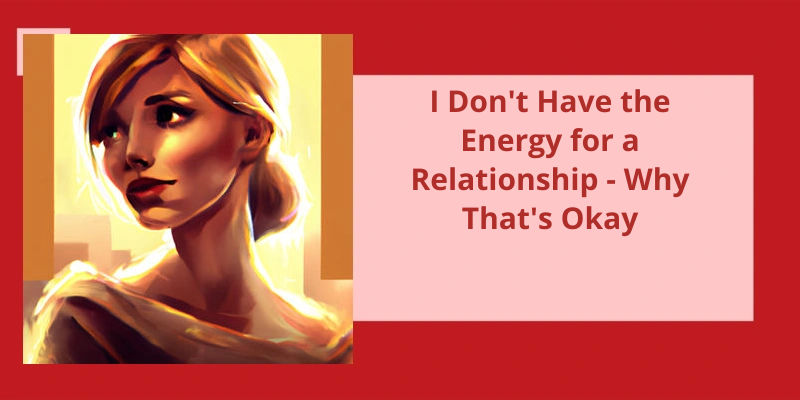Life can be exhausting at times, and there are moments when relationships may seem like just another chore to add to a never-ending to-do list. Whether it's due to career demands, personal goals, mental health struggles, or simply needing some time to focus on oneself, not everyone has the energy for a relationship. And that's okay. It's important to remember that there’s no "one-size-fits-all" approach to love and companionship. Some people may thrive in a highly connected, romantic partnership, while others may prefer the independence and freedom of being single. Ultimately, the decision to pursue or avoid a relationship is a personal one that should be made with honesty, self-awareness, and a clear understanding of one's own needs and limitations.
How Do I Get My Energy Back in a Relationship?
Maintaining a healthy and fulfilling relationship takes dedication and effort from both partners. There will inevitably be ups and downs, ebbs and flows, and times when it may be difficult to maintain the initial spark that attracted you to each other. But there are ways to reignite that spark and get your energy back. One way is to do exciting new things together. This can be anything from trying a new hobby or activity to taking a weekend trip to a new city. Exploring new things together won’t only keep things interesting, but also helps build a stronger bond as you navigate unfamiliar territory together.
Another way to maintain energy in a relationship is to have regular date nights. This can be as simple as dinner and a movie or as adventurous as a spontaneous road trip. The important thing is to set aside dedicated time for just the two of you to reconnect and have fun together. This can help break up the monotony of daily life and help you remember why you fell in love in the first place.
It’s also important to give each other space, both physically and emotionally. Everyone needs alone time to recharge and focus on individual interests and hobbies. This doesn’t mean a lack of commitment or interest in the relationship, but rather allows each partner to maintain their self-identity and come back to the relationship as a more fulfilled and energized individual.
Understanding the difference between spontaneous and responsive desire can also play a role in maintaining a healthy sex life and overall energy in the relationship. Spontaneous desire is when sexual arousal arises without any prior thought or desire, while responsive desire is when arousal occurs in response to environmental or emotional cues. Recognizing and communicating about these different forms of desire can help both partners know how to better meet each others needs and desires in the bedroom.
Finally, it’s important to stop complaining and start appreciating. Focusing on the negative aspects of the relationship can drain energy and lead to resentment and dissatisfaction. Instead, try to focus on what you appreciate about your partner and the relationship. Expressing gratitude and appreciation for each other can go a long way in maintaining positive energy and a healthy dynamic. By implementing these strategies, you can keep your relationship energized and fulfilling for years to come.
However, before making such a drastic decision it’s important to understand the root causes of exhaustion in a relationship. This article will delve deeper into the reasons why people feel exhausted in relationships and offer some tips on how to overcome it.
Is It Normal to Be Exhausted in a Relationship?
However, it’s essential to communicate your feelings to your partner calmly and openly before making such a drastic decision. It may be the case that your partner is unaware of the emotional burden they’re putting on you. In this case, couples therapy or counselling may be helpful for you both to navigate through any underlying issues.
It’s important to note that feeling exhausted in a relationship isnt uncommon, and it doesn’t necessarily mean your relationship is doomed. Relationships naturally go through ups and downs, and it’s normal to feel overwhelmed during more challenging periods. However, it’s crucial to recognize when the exhaustion is affecting your mental health and well-being.
If youre constantly feeling drained, it may be time to reassess the dynamics of your relationship. Are you both putting in equal effort to maintain the relationship? Are your needs being met? It may be helpful to have an honest conversation with your partner about what you need from them to feel supported and valued.
It’s also crucial to prioritize self-care in a relationship. It’s easy to get caught up in trying to please your partner and neglecting your own needs. However, self-care isnt selfish, and it’s essential to prioritize your own emotional and mental health.
Whether that means exploring couples therapy or having a conversation with your partner about your needs, it’s important to prioritize your emotional well-being and take steps towards a healthier relationship. Remember, it’s okay to walk away from a relationship that no longer serves you.
How to Recognize the Signs of an Emotionally Exhausting Relationship
- Feeling drained after spending time with your partner
- Constantly feeling unhappy or unfulfilled in the relationship
- Feeling like you’re always giving and not receiving anything in return
- Feeling like you’re walking on eggshells around your partner
- Feeling anxious or stressed when you think about your partner
- Feeling like your needs and feelings are constantly being invalidated
- Feeling like you’ve to change who you’re to make the relationship work
- Feeling like you aren’t being heard or understood by your partner
- Feeling like your partner is constantly criticizing or belittling you
- Feeling like you’ve lost your sense of self in the relationship
Maintaining a healthy relationship takes work and commitment, but sometimes the effort can take a toll. If you’re experiencing relationship fatigue or burnout, don’t give up hope. There are things you can do to rejuvenate your relationship and rekindle those feelings of love and connection. Here are seven tips to help you overcome relationship burnout and find happiness with your partner once again.
How Do You Fix Relationship Fatigue?
Maintaining a healthy and loving relationship can be challenging, especially as time goes on. Relationship fatigue, or burnout, is a common issue that can stem from a lack of communication, unmet expectations, and a loss of excitement. To overcome relationship burnout, it’s essential to address the root of the problem and take action to reconnect with your partner.
The first step in fixing relationship fatigue is to be honest about your needs and expectations. Communication is key in any relationship, and expressing your physical and emotional needs is critical to maintaining a healthy bond. Discussing what you both want out of the relationship and how you can support each other can help rebuild trust and intimacy.
Regular date nights or weekend getaways can provide a much-needed break from the stresses of everyday life and help rekindle the romance. Be present with each other during these moments, and engage in activities that you both enjoy.
Learning each others love languages is another great way to combat relationship fatigue. Everyone expresses and receives love differently, and understanding your partners love language can help you communicate your affection in ways that they understand and appreciate.
Sometimes, taking a break is necessary to overcome relationship fatigue. This break could be as simple as spending time alone to reflect on your thoughts and feelings, or as drastic as taking some time apart. Use this time wisely, and use it to reconnect with yourself and your partner.
Gratitude is another powerful tool in overcoming relationship burnout. Expressing appreciation for your partner and the things they do for you is an excellent way to boost positivity and bring balance back into your relationship. Be specific when expressing your gratitude, and let your partner know how much you appreciate them.
Lastly, practice self-care. Taking care of yourself is crucial to maintaining a healthy relationship. Make time for hobbies or activities that bring you joy, prioritize healthy habits like exercise and healthy eating, and seek support from trusted friends or professionals if necessary. By taking care of yourself, youre better equipped to show up fully for your partner and your relationship.
By being honest, setting aside time together, learning each others love language, taking a break, showing gratitude, and practicing self-care, you can overcome relationship fatigue and build a deeper, more connected bond with your partner. Remember that relationships take work, but the rewards are well worth the effort.
Source: Relationship Burnout: Signs, Causes & How to Overcome
Relationships can take a toll on us, and it’s easy to feel burnt out. Whether it’s due to ongoing conflict, lack of intimacy, or simply feeling disconnected, it’s important to acknowledge and address these issues. By recognizing the signs of relationship burnout and committing to self-care for both yourself and your partner, recovery from burnout is possible. With time, effort, and a willingness to work on the relationship, healing can begin.
Can You Recover From Relationship Burnout?
Relationship burnout is a state that occurs when two people become emotionally exhausted and depleted of any passion and intimacy in their relationship. It’s generally characterized by feelings of detachment, distance, and lack of interest in ones partner. It leads to boredom, frustration, and resentment, and can ultimately result in the end of the relationship altogether. It is, however, possible to recover from relationship burnout, but it requires both partners to be willing to make the necessary changes.
The first step towards healing is recognizing the signs of relationship burnout. These include a lack of communication, emotional distance, and disinterest in spending time together. It’s important to understand that this is a normal phase that many relationships go through, and that it doesn’t necessarily mean that the relationship is doomed. However, ignoring the signs and denying the problem will only make things worse. As such, it’s important to take action and address the issue as soon as possible.
One key to recovery is setting aside time for each other. Often, burnout is caused by a lack of quality time spent together. As such, carving out time in your busy schedule to do things together and to have intimate moments can help bring back the connection you once had. Additionally, doing things that you both enjoy, such as hobbies or travel, can help you rediscover the spark that brought you together in the first place.
It’s also vital to take care of both yourself and the relationship. This includes developing healthy habits and routines, such as exercise, eating well, and getting enough rest. It also means being honest with yourself and your partner about what you need emotionally and mentally. By taking a holistic approach to healing, youll be better equipped to address the challenges that come with burnout.
It takes effort from both partners to get through the tough times and to emerge stronger and closer than ever before. By recognizing the signs and taking action early, couples can recover from burnout and create a deeper, more fulfilling relationship together.
What Causes Relationship Burnout and How Can It Be Prevented?
Relationship burnout can be caused by a multitude of factors such as lack of communication, feeling unappreciated, and neglecting self-care. To prevent burnout, it’s important to prioritize open and honest communication, practice gratitude and appreciation, and regularly devote time and effort towards self-care and individual interests.
Relationships can be complex and there are times when we may feel less connected to our partner. It’s important to distinguish between a temporary disconnect and a persistent issue. While feeling nothing in a relationship may be concerning, it doesn’t always mean that something is fundamentally wrong. In the following sections, we’ll explore this topic in more detail.
Is It Normal to Not Feel Anything in a Relationship?
At times, couples may go through phases where they feel less enthused about their partner. This can occur for numerous reasons- the daily stressors of life, work, family commitments, personal struggles, hormonal changes, and so on. There could be various explanations as to why you aren’t feeling linked to your partner at the moment. It may be helpful to self-reflect and identify what’s going on in your life that could be affecting your emotions toward your significant other.
It’s important to remember that every relationship has it’s ups and downs. There’s a natural ebb and flow that occurs. There will be instances of closeness, where you feel as if nothing can come between you and your partner, and then there will be phases where you feel distant or less attached. This is a normal and common occurrence.
If youve noticed that youre feeling very little emotional attachment or connection to your partner for an extended period of time, there may be other factors at play. It’s essential to communicate with your partner, express your feelings, and identify the root of the problem to work through it together. It’s vital to understand that every situation is unique, so treatment for this type of scenario would vary from person to person.
It’s also essential to assess your mental state. Mental health issues such as depression or anxiety can contribute to a loss of emotional connection or a feeling of numbness towards others. If you feel that your state of mind is affecting your emotional relationship with your partner, it may be helpful to seek professional advice.
It’s perfectly normal to experience moments of detachment in a relationship. It’s essential to self-reflect and pinpoint any possible causes for this. It’s equally crucial to communicate openly with your partner, and if necessary, seek out professional help. Remember, there’s no one-size-fits-all solution for this matter, but the willingness to work through it’s a crucial step towards a happy and healthy relationship.
Conclusion
In conclusion, it’s important to recognize and respect one's own personal limits and boundaries, especially when it comes to entering into and maintaining a relationship. While many people may feel societal pressure to be in a relationship or to be constantly seeking one out, it’s crucial to prioritize self-care and preserve one's energy and emotional well-being above all else. Ultimately, relationships should enhance and enrich one's life, not drain or exhaust it. Therefore, it’s perfectly valid and healthy to acknowledge when one doesn’t have the energy for a relationship and to focus on other aspects of life until the time feels right. By doing so, individuals can cultivate a stronger sense of self-awareness and self-love, leading to greater fulfillment in all aspects of their lives.





